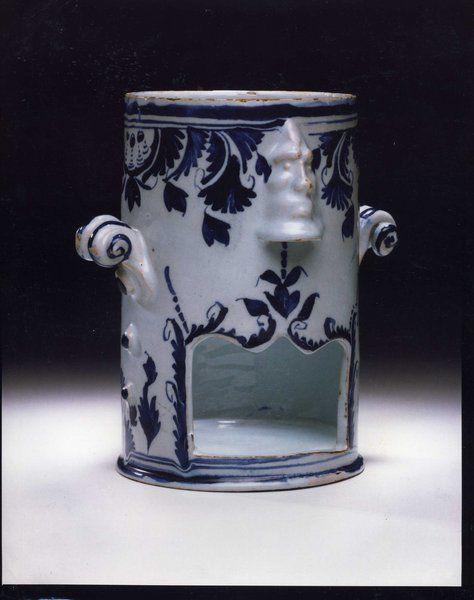A mid-18th century, English, delftware, food warmer
10562
Cylindrical base with lines encircling top with floral embellishments. Two ram's horn handles on the sides, male masks back and front to shield air vents and a front opening with a bracket-shaped top with floral embellishments. Lines encircling basewith stylised floral enbellishments. Decorated in blue on a bluish-greyish glaze Probably London, circa 1770.
Reference: English Delftware in the Bristol Collection (Britton) no 5.20. Liverpool Museum no 8.10.68. Reading Museum no 241.61.28. V & A no C.50-1939. As Fair as China Dishes (Archer & Morgan) no. 88 for a complete assemblage. British Delft at Williamburg (Austin) no 722. Lipski Collection Sale, 10/03/1981, lot 117.
Height : 17.50 cm
1034320
June 1996 Insurance Valuation
£ 800
Pap or caudle was an infant food consisting of bread or flour soaked in water or dilute milk. The papwarmer was probably intended for ministering to sufferers from mild indisposition or insomnia, and they were made in delftware from the middle of the 18th century. They are also called veilleuses due to their secondary function of providing a dim, illuminating light in the sick room or nursery at night. In the pattern book he published in 1774, Josiah Wedgwood illustrates a similar form calling it a 'night light' and stating that it was intended 'to keep any liquid warm all night'.
They were made in four parts, and very few examples survive in complete condition. The cover is surmounted by a knob fashioned to hold a candle. The base has handles at the sides and small holes, concealed by human masques, in the front and at the back allowing the smoke to escape. The large opening in the front of the base gives room to manoever a deep bowl with horizontal handles, which contained the food, in and out. This bowl is heated by a shallow cup containing oil and a burning wick
Harold Newman in Veilleuses 1750/1860 quotes delftware examples as dating from about 1750, "those from Bristol and Lambeth being almost indistinguishable, even by experts".
18th Century
1750
Bristol


